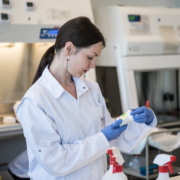Current issues in probiotic quality: An update for industry
By Dr. Mary Ellen Sanders, ISAPP, Dr. Kit Goldman, USP, Dr. Amy Roe, P&G, Dr. Christina Vegge, Dr. Jean Schoeni, Eurofins
With probiotic dietary supplement use growing globally and an increasing array of products on the market, probiotic quality is an issue of perpetual relevance to industry. Best practices for producing high-quality probiotics change frequently, making it important for companies to stay informed.
ISAPP convened a webinar on this topic, available to ISAPP members only. The webinar took place November 16, 2021, and was hosted by Executive Science Officer, Dr. Mary Ellen Sanders. Speakers focused on the activities of the United States Pharmacopoeia (USP), a non-profit organization based in the US and operating globally, which for the past 200 years has worked to improve public health through development of quality standards for medicines, dietary supplements and foods. In 2017 USP formed an Expert Panel on probiotics.
Dr. Kit Goldman, Sr Director, Dietary Supplements and Herbal Medicines, USP, spoke about the origin of USP and the USP activities related to probiotic quality. USPs expert volunteers have determined the necessary parameters for probiotic quality standards, which include tests for identification, assay/enumeration and contaminants, and have created standards for a number of probiotic species/strains. In the course of doing so, the Probiotics Expert Panel identified specific areas where more information was needed to fully understand issues related to probiotic quality. This led to the formation of sub-teams to consider aspects of probiotic identification, enumeration and safety.
Dr. Amy Roe, Principal Scientist at P&G, spoke on appropriate regulatory requirements for probiotic safety. Currently, there is no global harmonization on the requirements for establishing probiotic safety for use in foods and supplements. Although ‘history of safe use’ has been central to safety assessments for many current probiotic species, probiotic manufacturers are increasingly seeking to use new strains, species, and next-generation probiotics; justification of safety based on a significant history of use may be challenged. USP and other stakeholders are looking to develop best practices guidelines for assessing the quality and safety of probiotics. A current initiative of the USP seeks to provide expert advice specific to safety considerations for probiotics through reviewing global regulatory guidelines, evaluating appropriateness of traditional animal toxicology studies for studying the safety of probiotics, highlighting the importance of proper manufacturing practices with regard to final product safety, and outlining of essential parameters of a comprehensive safety assessment for a probiotic.
Dr. Jean Schoeni, Fellow at Eurofins, spoke on comparing probiotic enumeration methods. One challenge faced by the USP Probiotics Expert Panel is how to compare the increasing number of probiotic enumeration methods appearing in monograph submissions. A sub-team of the panel developed a solution that combines APLM (Analytical Procedures Lifecycle Management – a streamlined approach for determining the method’s fitness for intended use) with TI (tolerance interval) calculations. Schoeni encouraged companies to adopt this solution, highlighting tools that have been provided to the probiotics industry through publication of the sub-team’s work.
Dr. Christina Vegge spoke on quantification of multi-strain blends. For probiotic products comprising multiple strains, the viable numbers of each strain in these products would ideally be quantified. However, reliance on plate count methods creates analytical challenges regardless of whether the quantification of viable numbers of each strain in the blend is conducted prior to or after blending. Further challenges arise when addressing the reductions in potency over shelf life of the product. For multi-strain products, plate count procedures are insufficient—and currently no official guideline or general best practice exists to resolve this situation. Therefore, the USP Probiotics Expert Panel wants to conduct an explorative study to examine non-culture based technologies to quantify the viable composition of multi-strain blends.
A recording of this webinar is available for ISAPP industry members only. Please see here and email info@nullisappscience.org for the password to access this page.
Publications (open access) from USP Probiotics Expert Panel:
Jackson et al. Improving End-User Trust in the Quality of Commercial Probiotic Products. Front Microbiol. 2019 Apr 17;10:739. doi: 10.3389/fmicb.2019.00739.
Weitzel MLJ, et al. Improving and Comparing Probiotic Plate Count Methods by Analytical Procedure Lifecycle Management. Front Microbiol. 2021 Jul 12;12: 693066. doi: 10.3389/fmicb.2021.693066.





